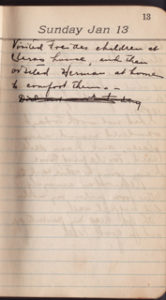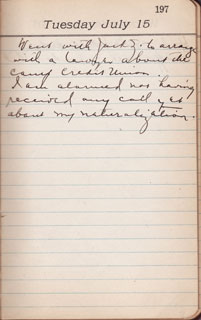 After working hours
After working hours
Spent entire eve. at home enjoying
the radio The part played by the
N.Y. Symphony Orch, Beethovens 5th Sy.
was most impressive. –
It touched my heart to read the
story of a Jewish girl of Romania arriving
in this country, was sentenced to be sent
back because the quota for that country was full.
She being a violinist took a chance
to try as an artiste, as such are
exempted from the draft quota, and in
the presence of the immigration
authorities she played Shuberts
Serenade while tears were streaming
from her eyes, this won her the
freedom of these shores.
What a dramatic climax for
a Jewish girl after years of suffering
finally winning the freedom of a
new Land with renewed hopes
for a better future.
———–
Geez.
As melodramatic as this story is, I get choked up when I view it through my grandfather’s eyes. His own emigration was only eleven years prior, and the sensations of the experience — from leaving his family and home of 18 years to the sea voyage itself to the stresses of his arrival at Ellis Island — must have remained as fresh in his mind as when he first felt them.
And so, aided by Papa’s capacity for empathy (so pronounced that I picked up on it when I was four and he was 75) his deep belief in the promise of his own American life, and his attachment to classical music, this tear-jerker about a Jewish girl winning her freedom with a sentimental classical tune earns immortality in his diary.
Updates
The more I think about it, the more I feel like I’ve seen something about a girl earning entry to America with a tearful violin solo in an old movie. Am I just mixing it up with the image of the violinist on the deck of the Titanic?
———-
Update 3/19
Here’s another way to listen to Schubert’s Serenade:


